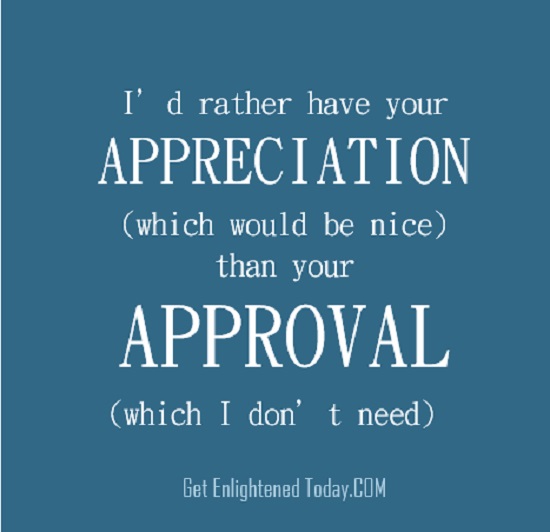Situation 1
A friend tries a dress on. She asks your opinion. You say either:
A. It looks great on you. I love it.
B. I like how it is so flattering.
Situation 2
Your child puts his toys away without being told. You say either:
A. Oh darling, thank you! That’s so nice.
B. Darling, I like that you put your toys away without being told.
Situation 3
Your partner unexpectedly sends you a bunch of flowers at work. You say either:
A. Honey, I just love the flowers and thank you so much for the thought!
B. Honey, I loved that you sent me flowers. It was so sweet of you.
Which did you choose? As or Bs?
Before I say anything else, I want to say that more important than the words, it is the INTENTION behind the words that is really important. Please keep that in mind as you read the rest of this post.
The Intention behind the words is actually and always what matters
All that counts in life is intention – Andrea Bocelli
So, that being the case, here’s the point that I wish to make:
There is a big difference between Appreciation and Approval. The As in the above quiz were intended to reflect Appreciation while the Bs were intended to reflect Approval.
Now, depending on the tone of voice and the Intention, you could argue that Bs could be expressed as statements of Appreciation. And you could argue that As might in fact be statements of Approval, or even sarcasm.
So I repeat,
It’s not the words so much as the Intention.
Right, so what then is the difference between Appreciation and Approval?
Let’s make it simple. When you see a gold-drenched mountain against a setting sun or a peaceful sapphire ocean yawning into the horizon, do you say or think
Oh, wow, that’s just so beautiful! (Or simply smile silently with sheer joy)?
Or do you say or think
I like it (the weather, the sun, the ocean) that it’s so beautiful today.
The first, I’m sure you’ll recognize immediately, is an expression of Appreciation while the second is an expression of Approval.
When we appreciate, we truly are enjoying in that moment, the beauty, the goodness, the kindness, the love, the joy that we are feeling. And that is what we express as a spontaneous response. Sometimes, we try to do this in words. But it’s not really necessary.
People can feel your appreciation, which is your spontaneous enjoyment of something through your body language, your facial expression, your tone of voice. In other words, through the energy field you share.
And they can feel a disconnect or incongruence when your words don’t match your feelings, your body language, your facial expression and the tone of your voice. It’s something we instinctively feel in our body, even if we cannot always give it a name.
When we approve, on the other hand, we are often being conditional. We are expressing what we like and what we expect and want others to do so that we can be happy and satisfied.
Most of the time, we don’t do this consciously. It is so built into our transactional way of living and relating to each other.
A gift consists not in what is done or given, but in the intention of the giver or doer – Lucius Annaeus Seneca
We always expect something in return for what we give and our ‘gift’ in these instances is Approval. It’s saying that I love you or love you more or most when you behave in these ways.
Examine this for yourself. Recall something that you felt spontaneously joyous about. Choose something impersonal like the serenity of a rainforest, the grandeur of a rising sun, the radiance of the moon in a cloudless dark sky…
As you remember it, allow yourself to get into the feeling-tone of it. Notice how light and effortless this recognition of something beautiful, of something good, feels.
This is Appreciation – the recognition of something good. It arouses spontaneous joy.
Now think of something good that happened and where you gave your approval or think of an incident when someone else approved something you did. Get into the feeling-tone of that and see if there is a difference.
Children are exceptionally good at detecting Appreciation and Approval. They sense the unconditionality of Appreciation as surely as they sense the conditionality of Approval. Test it out on them!
Some will learn the rewards from pleasing and will grow up to be strong approval seekers manipulating others by pleasing and agreeing (or not) to be pleased.
Some will make a special effort to withhold pleasing, cooperating or allowing their natural kindness to show. They will be the inverted pleasers, the rebels who ‘don’t give a f#%k’ or so they want you to believe and try to convince themselves.
And some will learn how to be a bit of both or a lot of one and a little less of the other. And perhaps this is where most of us fall.
The thing is, do we need to feel appreciated? And do we need to be approved?
The way I see it, Appreciation is more aligned with our natural survival mechanism. Seeing good, whether in ourselves or others helps us thrive. When we don’t, we’re more likely to wither emotionally and physically.
On the other hand, giving or receiving Approval tends to promote dependency or co-dependency wherein we rely on others for our sense of worth and wellbeing or our sense of power over another. Either way, it is disempowering.
When I express Appreciation, it is the goodness in you that awakens my joy. Your goodness is always there even when I don’t notice it. Your goodness and my Appreciation are unconditional.
When I express Approval, it is your behaviour that satisfies me by meeting my expectations. That behaviour may not always happen, and when it doesn’t, I will withhold my approval. Your behaviour and my Approval are conditional.
As I said at the beginning of the post, it is the Intention behind our words and not the words themselves that determines how much we are contributing to others (and our) wellbeing and thriving with Appreciation or to their (and our) dependency and disempowerment with Approval.
People may hear your words but they feel your attitude – John C Maxwell
Saying the ‘right’ words doesn’t mean that you’re actually feeling them. But that is what matters. That is what will either help relationships to thrive or help them wither.
Interestingly, in the Bible, the book of Genesis says that after creating each phase of the universe, ‘…God saw that it was good’.
That, to me, is very much about Appreciation. Not Approval.
This is how to avoid re-creating painful situations: Take the time to discover your real intention before you act. If it is to change someone or the world so that you will feel safe or better about yourself, don’t act on it, because it is an intention of fear and can create only painful consequences – Gary Zukav
Post Reading Reflection/Meditation
Get into a still, meditative space by sitting comfortably. Take a few slow, gentle and deep breaths focusing on the outbreath. Allow whatever tension in your body to be released in the outbreath.
Hold softly and spaciously in your mind the words ‘Allow’, ‘Soft’, ‘Kind’ or any word that helps you feel relaxed and open.
Now, slowly bring to mind something that you felt spontaneously joyous about. Choose something impersonal like the serenity of a rainforest, the grandeur of a rising sun, the radiance of the moon in a cloudless dark sky or its reflection on an ocean…
As you remember it, allow yourself to get into the feeling-tone of it. Notice how light and effortless this recognition of something beautiful, of something good, feels.
This is Appreciation – the recognition of something good. It arouses spontaneous joy.
Next, think of a time when you felt grateful for something or to someone. Bring as much of the detail to mind. Recall how you were feeling before the event and how you felt after.
Was there a sense of relief? Joy? Happiness? Did you smile?
Did you wonder what you would do to return the favour?
Practice getting into the feeling-tone of Appreciation and compare it with the feeling-tone of Approval. Do they feel the same? Different?
Which feels better? More freeing? More authentic? More joyous? More spontaneous (meaning it just happened without you even thinking)
How does your language change when you’re feeling and expressing Appreciation? Compare that with Approval. What about your body language, facial expression and tone of voice?
Finally, think of some instances when you have expressed Approval and consider if you could express Appreciation instead in a similar situation. How does that feel?
Want some help?
Would you like the help of an experienced, compassionate and committed Mentor with a personal or professional struggle or challenge? Here’s how I could help.
Are you having trouble keeping calm? Are you prone to anxiety or stress? Are you trying to cope with an illness? For many people, meditation has proved extremely helpful in these and many other situations. Learn the techniques and principles of Meditation as they apply to your specific needs h from an experienced teacher/guide.
MENTORING
Let Life express itself intoxicatingly, uniquely, powerfully and limitlessly in, as and through you. Don’t settle, whatever your age. Know your true Self. Follow your Bliss. Live the Life that you know you want to! Contact me here.
MINDFULNESS ONLINE
Join me every week to sit in the presence of your true Self and experience the greatness of Life flowing naturally, effortlessly and powerfully in, as and through you!

